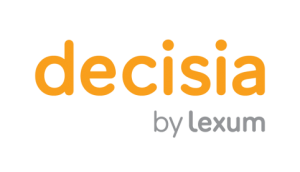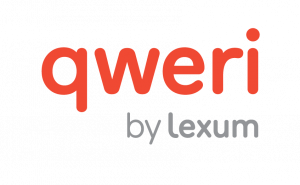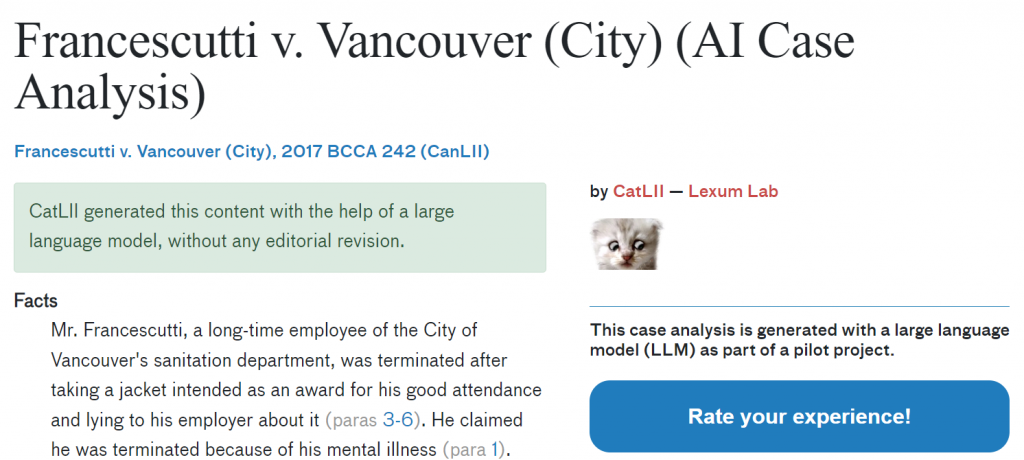As the year comes to a close, now is the time for a post-mortem of a prosperous year at Lexum and for digital legal information services in general.

Decisia has seen two updates this year. The first one, version 7.0, is a complete upgrade of the administrative interface with a new “info” tab, unique admin URLs, the ability to save in the background and a refined display of “Summary of access rights.” The last update of the year, version 7.1, is a back-end upgrade to the email notification service that was implemented on December 12th.

This year, Qweri development focused on advanced technical features enabling Lexum clients to leverage its service fully.
First, the introduction of two distinct linking mechanisms, stable and deep links, facilitated the connections with the body of documents hosted in Qweri. Second, we provided additional details about the conversion feature of Qweri that turns digital documents such as word-processed or PDFs into a fully-fledged dynamic HTML web environment.

With no less than three different iterations this year, Lexbox has seen the development of many new features, as well as a rebranding on the CanLII website. The first iteration of 2023, version 4.2, introduced the possibility of adding private annotations to a document directly from CanLII. With this new feature, Lexbox users can make their own notes without jumping between their Lexbox account and the CanLII website. The second upgrade, version 4.3, roughly made the former Premium features free for all CanLII users. This last change led to the rebranding of the CanLII website: Lexbox on CanLII is now called myCanLII. Visually, this provides for a better integration with the CanLII website. Features-wise, all services remain unchanged.
CatLII

CatLII, our feral legal animal, came back to oversee an AI pilot project analyzing and summarizing legal cases on CanLII Connects. CatLII generates short, standardized summaries of legal decisions published on the CanLII website and shared on CanLII connects. Domain-specific prompt engineering enabled CatLII to sequence facts, procedural history, parties’ submissions, legal issues, dispositions, and reasons. Each of these elements is dynamically linked to the relevant paragraphs within the body of the corresponding case, making it easy for the user to confirm (or infirm) the validity of its analysis.

Each AI-generated summary clearly states that the content is created without editorial revision and allows the reader to rate and comment on the quality of the analysis. CatLII was so successful that several Canadian law foundations recently announced grants for CanLII to process legal material from their respective provinces using the approach.
Improving Search by Leveraging the Citation Network
The citation network project enabled us to refine and conceptualize search results through AI. It works with a mix of Neural Links and Machine Learning to improve search results ranking via conceptual search, navigational search and general performance improvements.
Thanks to these tools, the Lexum search engine is now much better at returning highly authoritative documents for broad conceptual queries. For this kind of query, the document presented as the top result is more often the relevant statutes or the highly cited Supreme Court cases on the topic at stake. Also, the algorithm is much better at directing users to specific sections or concepts directly related to a legislative subunit. Finally, we have observed that results are coherent between conceptual queries and navigation queries that are essentially identical. For example, “Charter 2b” and “freedom of expression” now effectively return the same results.
Automatic Keywords and Classifications
Automatic Classification is another advanced AI feature developed by Lexum for the CanLII website in 2023. The Automatic Classification feature leverages AI algorithms and natural language processing techniques to categorize legal documents by subjects automatically. Our automatic classification algorithm analyzes the content and context of legal documents. It assigns appropriate subjects in the form of tags to each document. These subjects can include areas of law, legal topics, jurisdictions, court levels, and more. The subjects are integrated into the snippets accompanying search results alongside AI-powered keywords. They are also made available as a search filter under the Cases search tab.
Next Steps
All this hard work probably explains why CanLII is now acknowledged as the preferred reference source for Canadian case law according to the Canadian Guide to Uniform Legal Citation, aka the McGill Guide. CanLII publishes legal decisions from 383 courts and administrative tribunals. It also publishes consolidated statutes for all jurisdictions with point-in-time capability going back 20 years, consolidated regulations for all jurisdictions, and annual statutes for all jurisdictions. CanLII now has the best repository of Canadian primary law.
For 30 years now, Lexum’s mission has been to disrupt and democratize legal publishing by automating previously manual processes. Our vision was that case law and legislation could be made more widely accessible at a lesser cost through automated processes. For the same reason, AI has been central to many of our recent initiatives. In the short term, we plan to focus on a few very down-to-earth projects, such as scaling AI case analysis, introducing legislative summaries, and automated translations. In the longer term, we are working toward improving search results ranking through learning, implementing, and developing neural search, among other things.
Closing Notes, Closing the Year
This year has been quite eventful with the launch of OpenAI GPT4 and other Large Language Models (LLM). But more than this, every week has seen new announcements and game-changing technologies appear. As 2024 draws near, it’s only natural to wonder about the recent developments, their reliability and what it means to legal professionals.
To this end, we want to reassert that Lexum’s solutions do not rely on any pre-existing knowledge when using LLMs. This dramatically reduces the risk of hallucinations for the simple reason that our tools work within a controlled environment, be it a jurisdictional database or a single document. In addition, Lexum firmly adheres to the emerging guidelines and best practices in the use of AI. We are here to bring you the best of AI in a safe and professional environment, providing reliable results.
The second point is that, yes, all professions change and evolve, which is what the title of this post is all about. The arrival of AI in every sphere of our lives means that habits and processes will change, just like they’ve changed with the arrival of typing machines, the invention of phones, faxes, and the Internet. However, these technologies are not meant to replace people; they help people grow, adopt new skills, or save time that would otherwise be dedicated to tedious tasks.
As far as we are concerned, we look forward to 2024 introducing more AI innovations in our lives, but also more reliability and safety. We strongly believe AI is an essential tool in our quest for better access to justice. Lexum will be here to help set this path responsibly for the best outcome.
We hope that 2023 was kind to you, and we’ll see you next year. Happy 2024!








